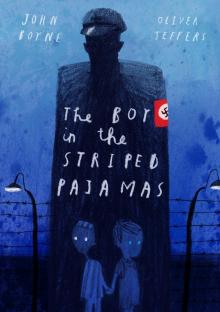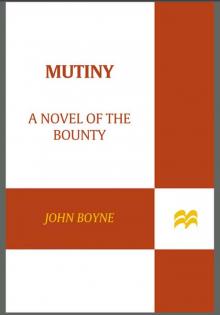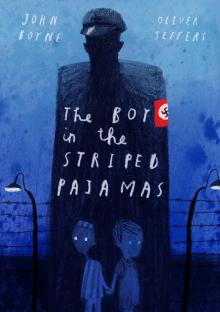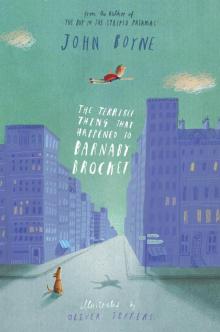- Home
- John Boyne
Next of Kin Page 15
Next of Kin Read online
Page 15
‘Owen Montignac?’ he asked, unable to conceal his surprise. ‘Peter Montignac’s boy?’
‘His nephew, yes. Not his son.’
‘No, you’re wrong there,’ said Roderick, shaking his head. ‘I used to know Peter many years ago. He did have a son.’
‘Yes, but he was killed in some sort of accident, I think. Owen is his brother’s boy. I read about it in the death notice last month.’
‘Well what of it?’ asked Roderick, who didn’t much like to be corrected, neither by defence counsel, prosecution barristers nor his wife. ‘And what does this Montignac fellow do anyway?’
‘I don’t know,’ said Jane.
‘You don’t know?’
‘Well not exactly anyway. I imagine it’s something to do with all the land he owns. He has properties all over London, you know. He’s extremely wealthy.’
Roderick scowled. He felt unsure what his attitude to this new piece of intelligence should be. On the one hand he didn’t much care for his son turning down the opportunity to come into chambers when there were more qualified men than him crying out for the spare desk, not to mention the pupillage of such an eminent man as Sir Quentin Lawrence. He himself had always loved the law and thrived in his career; he couldn’t understand why a son of his would not feel the same way. And he was wasting so much time! By the time he was twenty-four, Roderick had already established quite a name for himself as an advocate. On the other hand, however, there was no doubting Owen Montignac’s status in the world. If he was prepared to offer Gareth a position, then maybe it would be for the best. At least if he made a mess of it it wouldn’t reflect on Roderick in the way it would in chambers. He grunted, dissatisfied but accepting, and returned to his breakfast silently.
‘I didn’t even know that he was friends with Montignac,’ he said after a long pause during which Jane had begun to relax a little, thinking that he would allow this turn of events to continue unhindered for the time being.
‘Oh yes,’ she lied. ‘They’ve known each other for ages. They’re about the same age, of course. They probably run in the same set.’
‘Well you know what I think of them.’
‘I do, yes,’ said Jane patiently. ‘You’ve told me many times.’
‘It’s only because I worry about him,’ he said defensively. ‘Gareth is the sort who lands himself in trouble and then relies on me to get him out of it. You know that.’
‘But he’s not going to get in any trouble,’ she said, defending her son as always. ‘It’ll be a perfectly respectable job and—’
‘He was bloody lucky not to get sent down from Harrow, you remember. If I hadn’t—’
‘Oh, Roderick, that was eight years ago,’ protested Jane, who didn’t like to think about that awful incident and wished that everyone would just forget about it. ‘You can’t hold it against him for the rest of his life.’
He frowned. He had a lot more to say on the subject but at that moment Sophie, their family maid, entered the room with a small silver tray which held a letter. He looked at it in surprise for the morning post had already been and gone.
‘Another letter?’ he said, picking it up and noting the formal calligraphy of the address.
‘Just arrived, sir,’ said Sophie. ‘Hand delivered.’
‘Thank you,’ he replied, dismissing her and staring at the envelope for a moment. As a rule he didn’t like unexpected correspondence like this; it tended to bring bad news.
‘What is it?’ asked Jane as he took a clean knife from the table and slit the top of the envelope open. He extracted a piece of vellum paper with very neat type on it and let out a sigh of frustration as he finished reading the contents. ‘What is it, Roderick?’ she repeated, hating to be left in the dark.
‘It’s from the Lord Chancellor’s office,’ he explained. ‘He’s invited three KCs to meet with him next week to discuss a most important matter.’
Jane had to stop herself from laughing at the pomposity of it and Roderick stared across at her.
‘That’s what it says here,’ he said innocently. ‘A most important matter.’
‘How extraordinary,’ said Jane. ‘Whatever can it be?’
‘I have a pretty good idea,’ said Roderick, placing the letter back inside the envelope.
‘You do? What is it then?’
‘It doesn’t matter,’ he said dismissively. ‘I could be wrong.’
‘Roderick, tell me for heaven’s sake,’ said Jane, who couldn’t stand to be left out of anything, especially something as unusual as this. The last time her husband had been called to the Lord Chancellor’s office it was to inform him that he was to be knighted. What further honour could he have earned since then? ‘We don’t have any secrets, do we?’
He shrugged, wondering whether the amount of secrets she probably kept from him were enough that a herd of stampeding buffalo couldn’t knock them over.
‘Well I’ve sort of been expecting it,’ said Roderick quietly, looking around to make sure that Sophie or Nell hadn’t slipped unnoticed into the room. ‘Or dreading it, rather.’
‘Dreading what?’
‘I suspect the prime minister has asked the Lord Chancellor to take some initial soundings from senior judges.’
Jane frowned, trying to decipher what her husband might be talking about. A sudden idea came into her mind and she inclined her head, unsure whether this would be too ridiculous an idea to even suggest.
‘It’s not about…’ she began, unsure whether even to say it in case he laughed at her. ‘It’s not about the king, is it?’ she asked.
Roderick gave the faintest of nods. ‘I believe it could be,’ he said.
‘The king and this woman? This American woman?’
Roderick nodded again.
‘Well that’s ridiculous,’ said Jane, laughing it off. ‘Nothing’s ever going to come of that. It’s just a piece of London gossip, that’s all.’
‘Perhaps,’ said Roderick. ‘But oftentimes, gossip has a way of becoming fact.’
‘Oh I can’t believe it,’ said Jane. ‘The man’s not that stupid. And the prime minister wants to find out what you would all think about it?’
‘I imagine so. Constitutional implications and so on.’
Jane shook her head as if the entire thing was utterly absurd. ‘Well that seems an enormous waste of time,’ she said. ‘Four senior members of the judiciary talking about something that’s never going to come to pass in a million years! Sooner or later a suitable wife will be found for him and there’ll be no more talk of this woman, this Mrs Simpson or whatever her name is. Or she’ll get bored and return to her husband.’
‘I believe she’s planning a divorce, my dear,’ said Roderick.
‘Well she’ll return to America then. She’s no better than she ought to be anyway,’ she added with a sniff, standing up from the table and laying her napkin down and displaying the kind of resentment reserved for those intending to marry above their station from those who already had. ‘Anyway I don’t have time for this foolishness. I have to rush off,’ she said. ‘I have some shopping to do in town and then, for my sins, I’m meeting Eleanor Tandy who will no doubt spend the entire afternoon telling me what a wonderful son she has and what a charming daughter-in-law she’s about to welcome into the fold.’
She came over and kissed Roderick on the cheek and he put an arm around her waist, grateful for any and all kindnesses she offered him.
‘And don’t worry about Gareth,’ she said. ‘He’ll meet with Mr Montignac and all will be well.’
‘I hope so,’ he replied as she kissed him again and left the room.
He sat there silently for a few more minutes, considering the matter, and read the letter he had received once more, praying that on this occasion his wife would be correct and the whole thing would come to nothing. The last thing he wanted was any further publicity, or more newspapermen camped out on the doorstep. The neighbours would lose their reason entirely.
5
There were only two or three other people browsing downstairs, each one cooing over some inane canvas as they made reckless attempts at deciphering it. At most times during their opening hours both he and Jason Parsons were present on the gallery floor but there was rarely any need for both of them. Security wasn’t an issue as the canvases were tightly secured to the walls and most of the sculptures were too heavy to remove without being observed so he felt perfectly comfortable spending time on the upper floor without having to monitor what was taking place downstairs.
Montignac was standing on the mezzanine floor of the Threadbare, examining a light fitting that kept flickering on and off over an abstract painting when she stepped through the doors and looked around to locate her cousin; instinctively he moved back to a position from where he knew he would be invisible to anyone on the ground. He watched as she drifted around the front of the space, taking in some of the newer pieces on display, and walked towards the desk where he could usually be found at this time, checking through some catalogues or finishing off The Times crossword while his assistant took care of more trivial matters such as assisting the customers or attending to matters of fixture upkeep like he was currently engaged in.
A small bell chimed from below; Stella had tapped on it and he made his way to the balcony and looked down on her. They both spoke at the same moment.
‘Shop,’ she said.
‘Stella,’ he called out. ‘I’m up here.’
She turned her head upwards and grinned. ‘Hiding away, are you?’
He smiled and shook his head. He noticed that she was carrying three bags of shopping and wondered how much of his stolen money she had already spent that morning and how much more would be delivered into the cash registers of Oxford Street, Regent Street and Covent Garden before the day was over.
‘I’ll be down in a few minutes,’ he called out. ‘Make yourself comfortable.’
‘Thanks. I will.’
He watched as she deposited her bags behind his desk and took her coat off, laying it across his chair, and felt momentarily flattered and irritated by how much she could make herself at home in his place of business. He felt that this was one of her specialities; believing that the world existed purely for her comfort.
For a moment he cast his mind back to the first time he had laid eyes on his cousin. He was five years old at the time and had recently been delivered off a boat from Calais to Dover where his uncle, Peter Montignac, had collected him and driven him back to Leyville.
‘This is to be your home from now on,’ Peter explained to him as they drove along. ‘You’re to live with my wife and me and our two children. Are you happy about that?’ He spoke with enormous pride, as if he was God himself who, in an act of charity, was welcoming an unrepentant sinner through the gates of Paradise.
Montignac stared at the stranger, afraid to answer.
‘What’s the matter?’ Peter asked. ‘Cat got your tongue?’
He replied in faltering English and said he was glad to be there. He had never spoken anything but French during those first five years with his parents and was nervous of it now. His father, Henry, had taught him English but they had rarely employed it in day-to-day conversation; he found that he was uneasy about using the language now, scared that he might appear foolish or ignorant among his newly discovered relatives.
‘We’ll have to do something about that accent of yours,’ Peter said irritably. ‘Can’t have you talking like that around here. You’ll frighten the locals.’
Andrew was eight and Stella had just turned six when Montignac arrived to live with them. Their mother, Ann, explained to them that he was their cousin, that he’d lost both his parents and had no one else to look after him but them and they must treat him like a brother.
‘Why have we never heard of him before?’ Andrew asked suspiciously. ‘Why hasn’t he been here to play or come to any of my birthday parties?’
‘Well, because he’s been living in France,’ she explained. ‘It’s much too far away for someone to come just for a party.’
‘You’ve never even spoken of him before,’ Andrew said, nervous at the prospect of having another boy in the house and his own carefully carved-out position being usurped.
‘Of course I have. We’ve often told you about your cousin, Owen.’
‘You’ve never mentioned his name once,’ insisted Andrew quite correctly because the truth was that she never had. ‘What happened to his parents anyway?’
Ann sat her two children down in the library and tried to explain it to them in a way that she hoped wouldn’t scare them.
‘Well,’ she began. ‘You understand that there’s a war going on at the moment?’
The children nodded. Everyone knew about the war; it was all anyone ever talked about. Some of their friends’ fathers were even fighting in it but their father didn’t have to because he had important business to take care of in London.
‘Well your uncle, Owen’s father, was killed in a battle. And his wife—’
‘Our aunt,’ said Andrew.
‘His wife,’ repeated Ann. ‘Well she died in an explosion at a factory. But she was French, of course,’ she added, as if that meant she had probably brought it on herself. ‘She lived here for a time some years ago but that was before any of this.’
‘She lived here?’ asked Andrew, wide-eyed.
‘Long before you were born,’ said Ann. ‘I never met her myself. She was a maid when your grandfather was still alive.’
Andrew considered it and couldn’t quite understand how that could possibly be. ‘You’re saying that our uncle married one of our maids?’ he asked, unable to believe it for a moment.
‘It was all a very long time ago,’ repeated Ann, sorry that she’d begun this at all. ‘And it’s neither here nor there any more. The important thing is that we welcome their little boy into our home because he has nowhere else to go and if you can’t rely on family at times like this, well then who can you rely on?’
‘I’ll make him welcome,’ said Stella quietly, who had remained silent throughout all of this.
A little later that afternoon the children stood nervously at the door while their father’s motor car made its way up the driveway towards them.
‘Well?’ asked Peter of his young charge. ‘What do you think of it then? This is where your father grew up, you know. Magnificent, isn’t it? Perhaps he spoke about it from time to time?’
Montignac could hardly believe it. The house they had lived in in Clermont-Ferrand was perfectly pleasant but it was small, cosy enough to fit just the three of them. This house, on the other hand, was a mansion. It was like one of the castles that he had seen when his parents had taken him on a holiday to Versailles. He thought such places were just there for visiting or for housing museums; they could hardly have been places in which people actually lived. His mouth dropped open in amazement and he found it hard to accept that he was actually going to be staying there.
‘And standing at the door over there are your aunt and your cousins,’ he said, bringing the car to a halt. ‘They’ll make you feel at home.’
Although he had been a little scared of his uncle ever since arriving in England, he clung close to him now as the introductions were made. He was accustomed to being around other children in France but these two who called themselves Andrew and Stella seemed like an entirely different breed altogether. For one thing they were extremely clean and well dressed, unlike his old friends who were generally scruffy and bathed only once or twice a week. They both extended their hands politely for him to shake and said, ‘How do you do?’ and when he nodded politely and said, ‘Bonjour,’ they twisted their faces up in surprise and looked at their father for reassurance.
‘Now, now, Owen,’ said Peter. ‘Remember what I told you o
n the way here. We speak English in this country. There’s no need for any more of that.’
‘Oui, mais j’ai oublié le mot pour—’
‘Owen, you’re doing it again.’
‘Sorry,’ he said.
When he looked up again he saw Stella staring at him, not quite at his face but a little higher, and he knew that she was looking at his hair, surprised by how white it was.
‘It’s quite extraordinary, isn’t it?’ said Peter, following his daughter’s gaze. ‘At least we know we won’t lose him in the dark, eh? He’s like a torch. Well come on, old fellow,’ he said cheerfully then, putting his arm around the boy’s shoulders. ‘Let’s get you inside. You must be tired after your trip.’
And in they had gone, closing the large oak doors firmly behind them to begin his new life as the poor relation.
Montignac finished inserting a new tube bulb into the overhead fitting and switched it on. It worked perfectly. It was lighting up a large canvas, perhaps six feet by four, which contained a series of increasingly dark stripes, each one with a red circle drawn in the centre. The significance of the circles and the lines was beyond him but if he had been forced to choose the least reprehensible work in the gallery, this might have been it. It wasn’t as hideously awful as some of the other pieces on display, which perhaps explained why it had languished there for almost three months without even a hint of a buyer.
‘Owen.’
A voice from behind made him jump; he had been lost in his thoughts and memories and hadn’t heard her come up the stairs.
‘Stella,’ he said, breaking into an embarrassed smile. ‘Sorry for jumping. You startled me.’
‘When you’re quite ready…’ she said, smiling back at him and he noticed how even now, even after all these years, she could barely bring herself to look him in the eye. Instead her gaze was directed just a little north of his forehead as if it didn’t matter how many years she spent looking at him, it was still impossible for her to believe that such a shade of white could exist on a human being.

 Beneath the Earth
Beneath the Earth The Boy in the Striped Pajamas
The Boy in the Striped Pajamas Next of Kin
Next of Kin The House of Special Purpose
The House of Special Purpose A Ladder to the Sky
A Ladder to the Sky A History of Loneliness
A History of Loneliness The Heart's Invisible Furies
The Heart's Invisible Furies The Boy at the Top of the Mountain
The Boy at the Top of the Mountain Stay Where You Are and Then Leave
Stay Where You Are and Then Leave Crippen: A Novel of Murder
Crippen: A Novel of Murder The Absolutist
The Absolutist Mutiny: A Novel of the Bounty
Mutiny: A Novel of the Bounty A Traveler at the Gates of Wisdom
A Traveler at the Gates of Wisdom The Congress of Rough Riders
The Congress of Rough Riders The Thief of Time
The Thief of Time The Boy in the Striped Pajamas (Deluxe Illustrated Edition)
The Boy in the Striped Pajamas (Deluxe Illustrated Edition) The Terrible Thing That Happened to Barnaby Brocket
The Terrible Thing That Happened to Barnaby Brocket The Boy In The Striped Pyjamas
The Boy In The Striped Pyjamas Crippen
Crippen